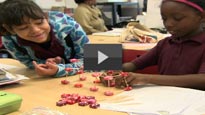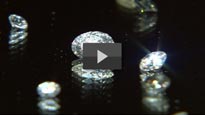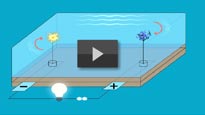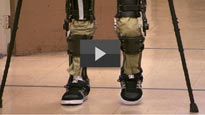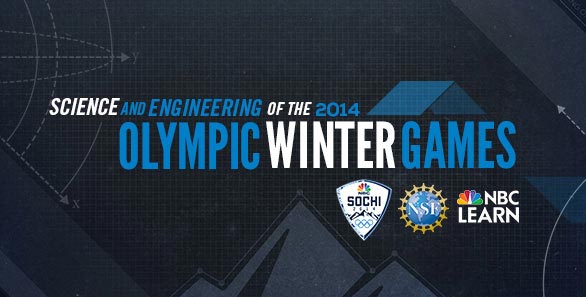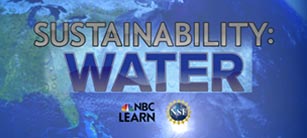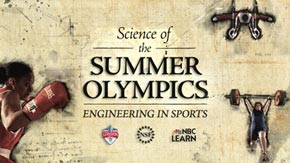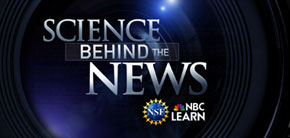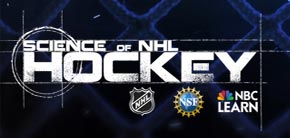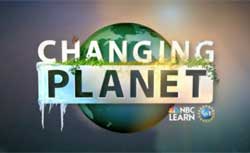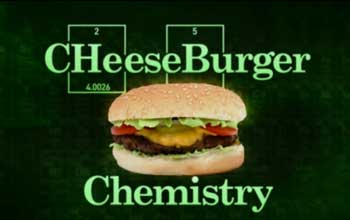
Special Video Report:
Science Behind the News
Courtesy: National Science Foundation and NBC Learn
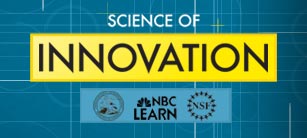
Whether it's from the simple desire to help others, our environment, or our way of life, innovation is a process that begins with imagination and results in the creation of something of value for society.
NBC Learn, in collaboration with the National Science Foundation, the U.S. Patent and Trademark Office and the National Science Teachers Association, explores the process of innovations in this compelling 11-week video series.
For more information: www.nbclearn.com/innovation.
Science of Innovation: What Is Innovation?
Whether it happens among students in a classroom, or engineers in a laboratory, innovation is a process, a series of steps that begins with imagination, and results in the creation of something of value for society. "Science of Innovation" is produced in partnership with the National Science Foundation and the United States Patent and Trademark Office..
Science of Innovation: Synthetic Diamonds
As an alternative to finding diamonds in nature for his scientific experiments, Professor Russell Hemley of the Geophysical Laboratory at the Carnegie Institution of Washington creates an innovative method of making large synthetic diamonds in the laboratory. "Science of Innovation" is produced in partnership with the National Science Foundation and the United States Patent and Trademark Office.
Science of Innovation: Smart Concrete
Concrete is one of the most common construction materials in the world, with its basic technology dating back to the ancient Romans. Engineers like Professor Deborah Chung at the State University of New York at Buffalo are using the innovation process to turn this old idea into a new technology. "Science of Innovation" is produced in partnership with the National Science Foundation and the United States Patent and Trademark Office.
Science of Innovation: Self-Driving Cars
At Google headquarters in Mountain View, California, computer scientist Sebastian Thrun and his team of software engineers are creating a fleet of self-driving cars. His innovative approach to artificial intelligence is what makes these cars such a success. "Science of Innovation" is produced in partnership with the National Science Foundation and the United States Patent and Trademark Office.
Science of Innovation: Fuel Cell Efficiency
Professors Reginald Farrow and Zafar Iqbal at the New Jersey Institute of Technology have collaborated on a series of innovations to make the energy conversion process that occurs within fuel cells as efficient as possible. "Science of Innovation" is produced in partnership with the National Science Foundation and the United States Patent and Trademark Office.
Science of Innovation: Electronic Tattoos
Professors John Rogers and Yonggang Huang have collaborated to design and engineer an electronic tattoo, a micro-electronic health monitor that adheres to the surface of human skin. Their work is an example of how collaboration is often a key part of the innovation process. "Science of Innovation" is produced in partnership with the National Science Foundation and the United States Patent and Trademark Office.
Science of Innovation: Bionic Limbs
Professor Homayoon Kazerooni is a robotics engineer at the University of California, Berkeley with more than 40 patents to his name. His research on exoskeletons relies on more than just ingenuity and engineering expertise, it's also an example of how inspiration can play a part in the innovation process, the simple desire to help other humans. "Science of Innovation" is produced in partnership with the National Science Foundation and the United States Patent and Trademark Office..
Science of Innovation: Biometrics
In a science known as biometrics, physical or behavioral characteristics are used for personal identification. Arun Ross, a professor at West Virginia University, explains that the sclera of the eye is another biometric trait that can be used, an idea he researched and patented. "Science of Innovation" is produced in partnership with the National Science Foundation and the United States Patent and Trademark Office.
Science of Innovation: Biofuels
While sources of biofuel currently exist, such as ethanol made from corn, Professor Steve Hutcheson at the University of Maryland is developing a new approach to producing biofuels from cellulosic biomass, using a bacterium discovered in the Chesapeake Bay. "Science of Innovation" is produced in partnership with the National Science Foundation and the United States Patent and Trademark Office.
Science of Innovation: Anti-Counterfeiting Devices
Electronics, apparel, and pharmaceuticals are only some of the products counterfeiters try to fake. Using nanotechnology, Professor Evangelyn Alocilja, a biosystems engineer at Michigan State University, has developed an innovative product authentication process that may help consumers determine if a product is genuine or fake. "Science of Innovation" is produced in partnership with the National Science Foundation and the United States Patent and Trademark Office.
Science of Innovation: 3-D Printing
3-D printing is an innovative manufacturing technique developed by Professors Michael Cima and Emanuel Sachs from the Massachusetts Institute of Technology. Once just used to create working prototypes, 3-D printers are now used by people from engineers to home inventors to make objects from their imaginations. "Science of Innovation" is produced in partnership with the National Science Foundation and the United States Patent and Trademark Office.
Distributed by NIEonline.com with permission
More NIE
Special Reports
►2014 Winter Olympics
►Fighting With Food
►Sustainability: Water
►Science of Golf
►Writers Speak to Kids
►Summer Olympics
►Science behind the News
►Science of Hockey
►Black History Month
►Changing Planet
►Cheeseburger Chemistry
►Chemistry Now
►Science of the Olympics
►Science of Football
►CyberBullying
About NBC Learn
NBC Learn is the educational arm of NBC News dedicated to providing resources for students, teachers, and lifelong learners. The online resources NBC Learn has created for the education community leverages nearly 80 years of historic news coverage, documentary materials, and current news broadcasts. Currently two offerings, NBC Learn K12 and NBC Learn Higher Ed, give students and teachers access to thousands of video clips from the NBC News archives, including great historic moments--from the Great Depression to the Space Race to the latest political coverage. NBC Learn also offers primary source materials, lesson plans and classroom planning resources, and additional text and image resources from our content partners. For more information, visit www.nbclearn.com.
About the National Science Foundation
The National Science Foundation (NSF) is an independent federal agency that supports fundamental research and education across all fields of science and engineering. In fiscal year (FY) 2010, its budget is about $6.9 billion. NSF funds reach all 50 states through grants to nearly 2,000 universities and institutions. Each year, NSF receives over 45,000 competitive requests for funding, and makes over 11,500 new funding awards. NSF also awards over $400 million in professional and service contracts yearly.
Additional Resources
NBC Learn | National Science Foundation
NBC Learn K12
